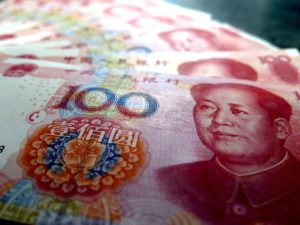China’s economy and its manufacturing are in what is increasingly looking like a long-term decline. I attribute most of this to two things that will almost certainly continue to worsen: geopolitics and demographics.
On the geopolitical front, Blinken did JUST meet with Xi and they said nice things that will reduce the likelihood of war, but nothing that has or will stop American and European companies from continuing apace with de-risking (f/k/a decoupling) away from China. On the demographic front all you need to know is that China’s birthrate and marriage rate (and people in China almost never have babies out of wedlock) are plunging. In the short term, worldwide inflation and dancing on the edge of recession is also not helping China. See China’s economy is way more screwed than anyone thought.
The bottom line is that many of China’s manufacturers are in trouble, and they know it. Sure, China is doing well with electric cars and solar, but many of its core industries are hurting badly.
In China’s Big Troubles: Its Days as Global Go-To Manufacturer May be Coming to an End, Forbes Senior Reporter Kenneth Rapoza does a great job explaining what is happening, and why, and why it is so harmful for China:
The problem is geopolitics. That should scare China’s investors more. They know the drill already. Companies are slow walking out of China because of those tensions. This includes Chinese companies investing in Southeast Asia to avoid trade tariffs, sanctions, and growing political risk.
To keep its business with the Americans (and to a lesser extent, the Europeans) Chinese companies are moving off the mainland. Their multinationals like Jinko Solar – one of the largest solar manufacturers in the world — are doing to China what American multinationals once did here – offshoring middle-class jobs.
The Gap, which used to source cotton fabrics from Xinjiang, is at least partially leaving China and replacing that labor and supply with Central America. They’ve invested $150 million there. It’s too complicated to know where every garment comes from, so rather than doing due diligence on hundreds of suppliers and trusting their answers, The Gap is investing elsewhere.
* * *
That may also explain the proliferation of promotional ads on social media of cool looking gadgets like steel coiled weed whackers and zipper repair units all undoubtedly made and shipped directly to Americans from China.
For Washington, bringing back manufacturing to the U.S., or at least protecting the manufacturing that is here now, is deemed critical. It is also a vote getter. No Democrat or Republican will ever win talking about the wonders of globalization and free trade with the cheap labor (and low income) states of the Asia Pacific.
- “The problem is geopolitics.” No U.S. politician (and increasingly, no EU politician) will ever win by talking about how great it is to lose manufacturing jobs to a country that constantly shows up in the news for aggression, oppression and spying.
- Even Chinese companies are leaving China, which increases the fear of those companies that remain.
- The Gap is leaving China because “it’s too complicated to know where every garment comes from, so rather than doing due diligence on hundreds of suppliers and trusting their answers.” If you think it’s complicated for the Gap, just imagine how complicated it is for your average mid-sized company. And with the DOJ making clear that it intends to closely scrutinize imports from China, you can see why nearly all companies that manufacture in China are at least contemplating their exit.
- “That may also explain the proliferation of promotional ads on social media of cool looking gadgets like steel coiled weed whackers and zipper repair units all undoubtedly made and shipped directly to Americans from China.” I can tell you that many of those “cool looking gadgets” are exact duplicates of “cool looking gadgets” that American and European companies are having Chinese manufacturers make for them and that these American and European companies are getting burned with these duplicates because they did not do what they should have done to prevent this from occurring. More on this below.
- “The erosion of China’s role as go-to manufacturer will likely become a matter of life and death — for industries, for businesses, for some people.” This is your big problem if you buy product from Chinese manufacturers. What is happening is viewed as a life and death issue for many Chinese manufacturers and that leads them to take your money and then disappear, to take your money and then not disappear but not make a single product for you, to duplicate your product and sell it directly to your market. More on this below.
Do Due Diligence on Your China Manufacturer NOW
It is even more critical now than in good times that you conduct due diligence on your China manufacturer.
The bare minimum due diligence on your potential China manufacturing partner should include the following:
1. Make sure you have your Chinese manufacturer’s actual Chinese company name. The easiest way to do that is to get its business license and confirm the name with the official Chinese government registry to see if your Chinese manufacturer has actually been registered as a Chinese company.
2. Make sure your Chinese manufacturer’s capitalization is both large enough and funded enough to handle your proposed deal.
3. Check the Chinese company’s operational status. You do not want to do business with a company whose license has been revoked or has been tagged as being at risk of revocation.
My law firm’s China due diligence team is seeing an uptick in Chinese manufacturers with revoked licenses or at clear risk of revocation. In International Manufacturing Update: China Down, Mexico Up, we discussed how Chinese companies about to go bankrupt (or already bankrupt) continue making product sales without any ability to make the product. The funds from these sales are pocketed by the owners/managers, who then disappear. See China Business Scam Week, Part 2: Bricks for Products. There are almost always warning signs.
The standard technique is to offer a discount to encourage a larger than usual purchase and then deliver nothing or almost nothing. Sometimes nothing at all is shipped. In other cases, a fraudulent shipment is made: a container full of bricks, barrels full of water or sand, or a refrigerated container full of damaged clothes, flour instead of an expensive chemical, or rotten instead of fresh fish. By the time the foreign company discovers the fraud, the Chinese company has already been liquidated and its owners/managers have disappeared.
4. Make sure your Chinese manufacturing company is legally authorized to do the type of business it is proposing to do with you.
5. Check the history of the Chinese company with which you might do business. If you cannot verify its history, you are at greater risk.
6. Investigate what property and IP the Chinese company owns. Companies that own property/IP are less likely to steal your money or duplicate your product than a company with nothing or nearly nothing.
7. Find out the Chinese company’s litigation history and whether it is having or often has problems with the government. We have learned that government problems are a terrific indicator of a Chinese company going downhill fast.
Your Manufacturing Contract Should Prohibit Your Chinese Manufacturer from Copying
As Rapoza’s Forbes article says, Chinese factories are increasingly making their own products for selling directly to consumers. And yet, at least once a week, my law firm gets an email from a company that seems shocked to have discovered that their Chinese factory registered their trademark in China and is selling their product for 25-75% less than they are.
With online selling having become so easy for Chinese factories, your product has never been more at risk for competition by the factory to which you have armed with your molds, your know-how, and your technology. Chinese factories know this, and many are agreeing to manufacture products at money-losing prices so they can take the information they learn from you to compete directly with you. Since you will essentially be educating your Chinese manufacturer on how to compete with you, you need contracts and IP registrations that will at least limit what it can do when it does.
The following will help you determine what you should be doing to reduce or eliminate this sort of competition:
- China NNN Agreements
- China Product Development Agreements
- Manufacturing in China: Minimizing Your Risks by Doing Things Right
- China Contracts That Work
If you do not have what you need from the above to protect your company and your products, get what you need now. And whatever you do, do not leave China until you have these things in place. In a free webinar tomorrow (go here to sign up), we will be discussing why it is so important to get your China ducks in a row before you leave.
Speed Up Your Plans to Move Your Manufacturing from China
China is not going to get any safer or less risky and for most (but not all) of you, it makes sense to manufacture elsewhere. If you are contemplating leaving China, I urge you to sign up for and attend our webinar tomorrow on Leaving China for Mexico. The first part of this webinar will be focused entirely on what you should do before you leave China and though the second part focuses on what you should be looking at to get into Mexico, the bulk of even that portion will be applicable to just about any other country as well.

























